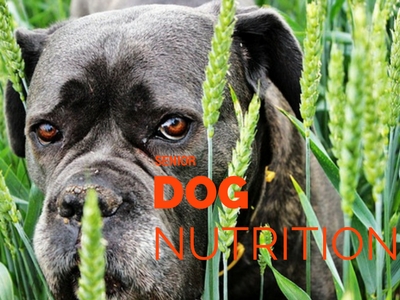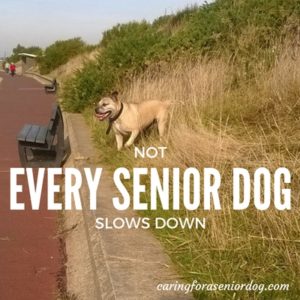
Welcome to this guest post about Senior Dog Nutrition
I’m so pleased to introduce my guest author, Carlotta Cooper. She writes for Dog Food Guide, is a long-time contributing editor for the weekly dog show magazine Dog News, the author of The Dog Adoption Bible, the Dog Writers Association of America Adoptashelter.com Award winner for 2013. In addition, she’s written Canine Cuisine: 101 Natural Dog Food & Treat Recipes to Make Your Dog Healthy and Happy.

Like many of you, I’ve lived with a lot of old dogs. Some of them I’ve had from the time they were puppies and others I’ve taken in as rescues.
In all cases I’ve seen their nutritional needs change as they get older.
Is Any Food Labeled for Senior Dogs Healthy for Yours?
The problem is that commercial dog foods, for the most part, don’t provide a good selection of foods for older dogs.
The first time I noticed this problem was with my old dog, Jasper. To this day I think Jasper may have loved me more than any dog I ever had – and the feeling was mutual.
Jasper had been dumped by his owners at the pound and his breeder was lucky enough to get him back. He was very underweight and she had to nurse him back to health.
He came to me when he was 18 months old but he had separation anxiety issues.
I fell in love with him at first sight. He was never more than a few feet away from me if he could help it.
He had a good appetite but he was a nervous dog, as you might expect. As he got older, it became harder to keep weight on him. He was healthy, per the vet, but he wasn’t metabolizing food as efficiently as a younger dog would.
I started looking at senior dog foods for him. That’s when I learned that most senior dog foods are no good for older dogs if they aren’t overweight.
If you check with AAFCO or the other powers that determine the proper nutrients for dogs, they say that there is no special guidance for senior dogs . There is growth and reproduction, maintenance, and all life stages for dog foods, but nothing for senior dogs.
This is a pity because senior dogs do have some special requirements.
Energy Needs of Older Dogs
Because of decreased physical activity and slowed metabolism, older dogs need 20% fewer total calories than do middle-aged adult dogs.
For this reason, as dogs age, they tend to become overweight if they are fed the same amount.
It may take obese dogs longer for their blood glucose concentrations to return to normal. This disrupted carbohydrate metabolism can lead to diabetes.
The pamphlet Your Dog’s Nutritional Needs, written by The National Research Council of the National Academies was based on a report by the Committee on Nutrient Requirements of Dogs and Cats. These are the people that come up with the nutritional requirements for our pets.
If you’ve ever had a skinny old dog, you know that he can’t survive based on that recommendation of feeding him 20 percent fewer calories than a middle-aged dog.

Most dog food manufacturers make the assumption that dogs that are past their prime adult years (1-7 years) are slowing down and gaining weight. So, they make “senior” dog food with fewer calories and, very often, with less protein.
In fact, if you check their labels, some foods are even marketed as senior AND weight control foods. The idea is that being chubby is unhealthy for these older dogs.
Yes, being overweight is unhealthy for your dog and some of these dogs that are getting older can stand to lose a few pounds. However, there are many elderly dogs that are losing weight.
They may be thin and have trouble holding onto their weight. Owners struggle to get them to eat. The older dog’s sense of smell and taste begins to dull as he ages so food is less tempting.
There should be some senior dog foods designed for these dogs and it should not be a low calorie or low protein dog food.
The fact is that most older dogs need more protein than younger dogs, not less. (Mary Straus at Dogaware.com has excellent information on protein and older dogs).
As dogs age, they metabolize protein less efficiently than before so they need more protein, not less, and the protein needs to come from better quality sources so it is easier to absorb.
If they don’t get enough protein, they will start to break down their own muscle tissue which leads to their body wasting and other problems. Their immune system will start to fail.
For many years people worried about giving old dogs too much protein because of possible kidney issues but unless your dog has a serious kidney health problem, there is no reason to avoid giving him more protein in his diet.
Ironically, cat nutritionists have known this fact for a long time. They recommend that aging cats get more protein and not less.
A cat’s energy needs decrease until 11 years of age, then increase as the cat continues to age. Obesity is one of the main health problems of middle age (6-8 years of age) cats; it occurs less often by the age of ten, and greatly decreases after that.
Some studies have shown that senior cats do not digest, and thus absorb fat and protein, as well as younger cats. This means that older cats may need to consume fat and protein that is more digestible to get the same amount of energy.
It seems pretty obvious that dogs are more like cats than many people have previously realized.

I have also had older dogs who were chubby. It’s true that some senior dogs do need some help staying slim. Being overweight puts more stress on their bones and joints and can worsen any tendency toward arthritis.
If your older dog is overweight, you can try cutting back on his regular food rations (slightly) or try feeding a food that has a little less fat. Many of the super-premium dog foods popular today have a high percentage of fat.
You can find some very good quality dog foods that have more modest fat levels.
If you choose a low-calorie or low-fat diet, your senior dog is probably going to be very unhappy with you – and feel hungry all the time. Just reducing the fat percentage in the food slightly will make a big difference in the long run.
If your senior dog is underweight, you can try switching to a food that has a slightly higher fat content. Again, you don’t have to make a drastic change but increasing the fat content slightly can make a positive difference to your dog’s weight.
Extra fat in the diet can also make the food taste better and be more appealing to your underweight dog.

When choosing a good food for your older dog, be sure to figure the dry matter basis for the food. Experts recommend the protein percentage should be at least 25 percent, with moderate fat (12-18 percent).
Remember that most dog foods that are sold as “senior/weight control” dog foods are very high in carbohydrates. They are often low in protein and have fewer nutrients than foods with more protein.
When choosing a senior dog food, it’s better to look for one that has plenty of protein from good quality sources and sufficient fat for your dog. Even if your older dog needs to lose weight, a food with low-moderate fat (12-13 percent) can help him slowly shed a few pounds.
It’s also important to remember that your dog’s weight is often an indicator of his overall health. If he gains or loses weight quickly, it can be a sign of an underlying health problem.
Take him to the vet as soon as you notice any unexpected changes in his weight or body condition. As your dog ages, you have to stay alert to what his body tells you about his health.

 Arthritis and Dogs
Arthritis and Dogs
Interesting blog, its sad to see our fur babies in the old age, but its our duty to make sure they are as comfortable as can be 🙂 Great article!
Thank you Andy. We never like to think of our pets getting old, and sadly too many people dump their animals just when they need us most. It is definitely our responsibility to keep our dogs as healthy, happy and comfortable as possible, but I also see it as a pleasure.